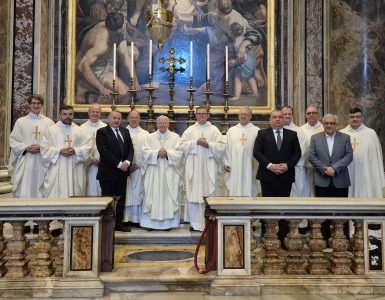Attempt on the Life of John Paul II
Archives of secret security services and accusations against Karol Wojtyła. Professor Łucja Marek, a historian from the Institute of National Remembrance in Krakow, specializing in the relationship between the state and the Church during the PRL (People’s Republic of Poland), including the operational methods of the security apparatus towards the Catholic Church, presented the government’s attitude towards the Church. Pressure on the Church was then explicit and, at times, physical. Over time, in the pursuit of “closing the Church within itself” and subordinating it to the authorities, actions were taken, including the removal of bishops from dioceses and the arrest of clergy, including the three-year internment of Cardinal Wyszyński. The communist regime, from its inception in 1945 until 1989, treated the Catholic Church and the clergy as its number one enemies, and there was a keen interest in Karol Wojtyła from the security services starting in 1946 when he was a seminarian at the Jagiellonian University until his election as pope. Files with documents in the archives of the security services describe monitoring, persecution, and step-by-step control.
The historian pointed out that the secret police began to sketch a picture of the priest Karol Wojtyła as both gentle and determined. This is evident, for example, in the transcripts of conversations that Archbishop Wojtyła had with authorities on specific matters or in the correspondence between the Krakow Curia and various offices. Marek emphasized that his attitude was decisive and determined. When he became the Metropolitan Archbishop of Krakow, he demanded contact with authorities at the appropriate level. He also insisted on treating the Church as a subject, not as a kind of supplicant, which somewhat diminished the authority of the hierarchy.
She also mentioned the unsuccessful attempts by security to sow discord between Archbishop Karol Wojtyła and Cardinal Stefan Wyszyński by portraying the former as a young, dynamic hierarch who would somehow control the actions of the latter. Wojtyła’s stance was one of complete loyalty. Even if they had differing opinions on some matters, as evidenced by the protocols of the meetings of the Episcopal Conference, these were their internal affairs, and externally they were characterized by unity, said the historian.
Secret services of communist countries and the attempt on the life of Pope John Paul II. Contribution and new findings of the Polish investigation.
It was Wednesday, May 13, 1981. In Rome, it was 5:19 PM. During the general audience in St. Peter’s Square, shots were fired at Pope John Paul II. The exact number of shots is still unknown. The news spread like wildfire around the world, especially in Poland.
People immediately filled churches, and masses began for the intention of saving the Pope’s life. Every piece of news coming from Rome—this was not the time of cell phones, the internet, and instant information exchange—was passed from mouth to mouth. He is undergoing surgery, lost a lot of blood, is conscious, Dziwisz is with him all the time, Gemelli is the best hospital, they are still operating on him—good and bad news crossed each other, everyone added something of their own. On May 17, we breathed a sigh of relief. The Pope recited the Angelus prayer from his hospital bed, and on May 23, the doctors issued a statement that there was no longer any danger to the life of John Paul II. “The Holy Father immediately after the incident, while he still had consciousness and some strength, said that he offered it for humanity, for the Church, and thanked God for the opportunity to offer his life for these intentions,” said Cardinal Stanisław Dziwisz, a witness to the attack.
John Paul II’s attitude towards communism was clear and widely known, as was his sympathy for Solidarity. Few believed that the Turk Ali Agca, the direct assailant, had come up with everything on his own. Suspicions were directed towards those who could benefit the most from the death of the Pope. The eight-year investigation conducted by the Institute of National Remembrance (IPN) into the attack on John Paul II was closed in May 2014. The mastermind behind the attack is still unknown, but the investigation was not in vain. Its results were summarized in a publication titled “Agca was not alone. Involvement of Communist Special Services in the Attack on John Paul II” released by IPN and “Gość Niedzielny.” Prosecutor Michał Skwara, who led the investigation, concluded that new findings allow us to hypothesize that the Bulgarian intelligence directly participated in preparing the attack, using the Turkish criminal environment for this purpose. It was a perfectly executed operation. Agca was handled by the Bulgarian services since the end of 1979, and during the investigation and court proceedings, he was effectively intimidated by them. It is also justified to say that many mistakes were made during the Italian trials, and there were political pressures, as openly admitted by one of the judges during a conversation with Prosecutor Skwara. The ambiguous stance of countries such as the United Kingdom, France, and Germany, which refused to interrogate key witnesses for clarification, should also be noted.
Unexplored traces in the attack on the life of Pope John Paul II.
Director of the Katowice branch of IPN, Dr. Andrzej Sznajder, presented the attack from a historical perspective as described in the book “Agca was not alone” by Dr. Andrzej Grajewski, a historian and editor of “Gość Niedzielny.” He emphasized that Prosecutor Skwara’s findings do not contain as solid evidence as, for example, an order to kill the Pope signed by the Soviet authorities. Still, there is a large amount of evidence confirming what the Italian prosecutors failed to prove. During the investigation, many essential “links” were found that connect individuals and events, the actions of intelligence services, and the criminal world. Everyone knew as much as they should, being under constant control by others. It was a meticulously prepared operation by special services.














